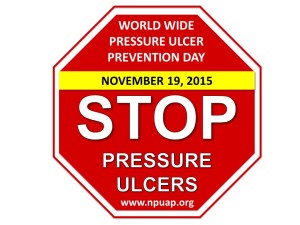
Very soon now humanity will reach a tremendous milestone. For the first time in recorded human history, there are going to be more people over the age of 65 than under the age of 5. Some experts predict that, by 2050, the 65+ population will comprise roughly 16% of the global population. So if you felt you’ve been seeing more old people around lately, you’re right.
Statistics aside, the elderly are a population that we always have in mind here at Mobile Health. Our close relationships with Home Care Agencies give us a unique perspective on this phenomenon. Many seniors are bedridden and wheelchair bound, and unfortunately, they are the most at risk for medical device-related pressure ulcers. Now, more than ever, we should start thinking about our senior population and their medical issues.
November 19th is World Wide Pressure Ulcer Prevention Day, and in its honor, we want to leave you with a few best practices for the prevention of medical device-related pressure ulcers. We hope you or your staff uses these tips provided by the National Pressure Ulcer Advisory Panel’s website to avoid the contraction of any unnecessary bedsores in any of your patients.
The National Pressure Ulcer Advisory Panel recommends that you…
- Choose the correct size of medical device(s) to fit the individual
- Cushion and protect the skin with dressings in high-risk areas (e.g., nasal bridge)
- Inspect the skin in contact with device at least daily (if not medically contraindicated)
- Avoid placement of device(s) over sites of prior or existing pressure ulcer
- Educate staff on correct use of devices and prevention of skin breakdown
- Be aware of edema under device(s) and potential for skin breakdown
- Confirm that devices are not placed directly under an individual who is bedridden or immobile
Remember that this is best left to the professionals, but if you have more questions about bed sores along with how to prevent them, give the NPUAP’s website a visit. As always, Stay healthy!
Tags: bedsores, Best Practices, Health Awareness, Home Care, Long term care, Pressure Ulcer, Senior Care, Seniors, wellness
